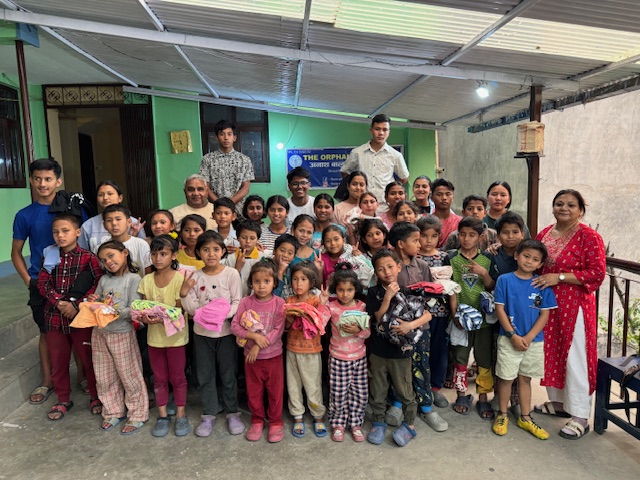Introduction:
Tamana, Rina, and Anika have a shot at a good life in the future—like you and me. They, however, don’t come from comfortable homes where gaining a good education is all that is expected of them. These girls make their way to Sawan Dharmarth Aashram (Reg) from the bustling streets of an Indian slum nearby, battling the chaos and hustle. They navigate a world fraught with challenges and barriers to receive support to pursue their studies.
Bringing 200 pieces of clothing along with stationery items, we have attempted to reach out our hand in friendship to ensure inclusivity. Moreover, we hope to foster a sense of dignity and belonging while also providing essentials for their learning.
Listening to their inspiring stories of overcoming the lack of access to education to gender inequality and social stigma, their journey is marked by resilience, strength, and determination. In this blog, we shed light on the lives of young girls living in slums, highlighting their struggles, aspirations, and the power of education and empowerment to create awareness that can help break the cycle of poverty and transform lives.
- Poverty and Lack of Resources: For many young girls in Indian slums, poverty is a harsh reality that shapes every aspect of their lives. Limited access to basic necessities such as clean water, nutritious food, and healthcare exacerbates their vulnerability and hampers their ability to thrive. Economic hardships often force girls into child labor or early marriages, robbing them of a happy childhood and future opportunities.
- Gender Inequality and Discrimination: In patriarchal societies like India, gender inequality permeates every sphere of life, disproportionately affecting young girls in slums. Discriminatory practices, such as preference for sons, limited mobility, and restricted access to education, reinforce traditional gender roles and limit girls’ potential. Deep-seated cultural norms and attitudes perpetuate a cycle of oppression and marginalization, denying girls the right to equality, autonomy, and self-determination.
- Barriers to Education: Education is often touted as a pathway out of poverty, yet many young girls in Indian slums are denied this fundamental right. Factors such as lack of schools, distance to educational facilities, and financial constraints hinder girls’ access to quality education. Moreover, gender biases and societal expectations prioritize boys’ education over girls’, further widening the educational gap and poverty and inequality. Therefore, it is critically important to educate girls to break this perpetuating vicious cycle.
- Vulnerability to Exploitation and Abuse: Living in overcrowded and unsanitary conditions, young girls in Indian slums are particularly vulnerable to exploitation and abuse. Trafficking, child labor, sexual harassment, and violence are pervasive threats that loom large over their daily lives. Limited awareness and resources to address these issues leave girls unprotected and voiceless, perpetuating cycles of victimization and trauma. Therefore, it is important to aid organisations that work on the frontlines of addressing these issues.
- The Power of Empowerment and Education: Despite the myriad challenges they face, young girls in Indian slums possess incredible resilience, courage, and determination to create a better future for themselves. Empowerment initiatives that focus on education, skill-building, and leadership training can provide girls with the tools and opportunities to break free from the cycle of poverty and realize their full potential. By investing in girls’ education and empowerment, we can unleash a powerful force for change that not only transforms individual lives but also uplifts entire communities and societies. No wonder the slogan on the Sawan Dharmarth Aashram gate sums up all their efforts with “Beti bacho, Beti Parhao, Beti Basao.” It loosely translates to “Save a girl child, educate a girl child, empower a girl child.”
Conclusion: The stories of young girls living in slums who break away from the cycle of poverty are a testament to their strength, resilience, and unwavering spirit in the face of adversity.
By investing in education and empowerment initiatives, we can address the root causes of poverty, inequality, and discrimination and create a more inclusive and equitable society. Let us stand in solidarity with them, amplify their voices, and work together to build a brighter and more hopeful future where everyone has a voice, irrespective of gender.


